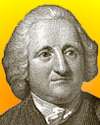
On 10 Jun 1706, John Dollond was born, the British maker of optical and astronomical instruments who developed (1758) and patented an achromatic (non-colour-distorting) refracting telescope.
For a brief biography, read the chapter “John Dollond” from Men Worth Imitating (1871).
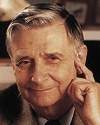
On 10 Jun 1929, Edward O. Wilson was born, an American biologist who is one of the world's leading scientists in his field of specialization. Today's book pick is: , by , an autobiography in which he records his growth as a scientist and the evolution of the science he has helped define. As the narrative of Wilson's life unfolds, the reader is treated to an inside look at the origin and development of ideas that guide today's biological research. Theories that are now widely accepted in the scientific world were once untested hypotheses emerging from one man’s broad-gauged studies. The story of Wilson's life provides fascinating insights into the making of a scientist, and a valuable look at some of the most thought-provoking ideas of our time.
It is available from Amazon, typically about (As of earlier time of writing - subject to change.)
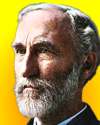 | The history of science alone can keep the physicist from the mad ambitions of dogmatism as well as the despair of pyrrhonian scepticism. |
 | If history and science have taught us anything, it is that passion and desire are not the same as truth. The human mind evolved to believe in the gods. It did not evolve to believe in biology. |
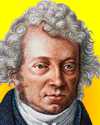 | The future science of government should be called “la cybernétique”. |
| Before you look at today's web page, see if you can answer some of these questions about the events that happened on this day. Some of the names are very familiar. Others will likely stump you. Tickle your curiosity with these questions, then check your answers on today's web page. | |
| Births | |
 | Edward O. Wilson, born 10 Jun 1929 is an American biologist recognized as the world’s leading authority and who has conducted extensive studies of the ecology and evolution of a particular life form He has travelled the world studying it, and he has discovered several new species. These currently number practically 9,000, but Wilson predicts that count will someday total nearly 20,000. What life form is his specialty? |
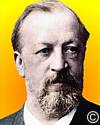 | Nikolaus August Otto, born 10 Jun 1832 was a German engineer who developed the first practical alternative to the steam engine as a power source. What power source did he develop? |
| Deaths | |
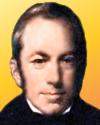 | A Scottish botanist (1773-1858) is best known for his description of the natural continuous motion of minute particles in solution, which came to be named after him. In addition, he recognized the fundamental distinction between the conifers and their allies (gymnosperms) and the flowering plants (angiosperms). He recognized, and coined the name for, the cell nucleus (Latin: “little nut”). He also improved the natural classification of plants by establishing and defining new families and genera. Can you name this man? |
 | A French mathematician and physicist (1775-1836) founded and named the science of electrodynamics, now known as electromagnetism. His interests included mathematics, metaphysics, physics and chemistry. In mathematics he worked on partial differential equations. He also made significant contributions to chemistry. For a then unknown element, analogous to chlorine, he suggested the name fluorine. He produced a classification of elements in 1816. He also worked on the wave theory of light. By the early 1820s, he was working on a combined theory of electricity and magnetism, after hearing about Oersted's experiments. Can you name this man (hint: an electrical unit was named in his honour)? |
| Events | |
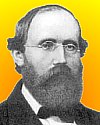 | On 10 Jun 1854, Georg F.B. Reiman made a proposal concerning space. Reiman proposed that space was ...? |
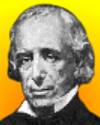 | On 10 Jun 1809, the paddle-wheel steamboat Phoenix sailed from New York City to Philadelphia, Pennsylvania. It was the first steamboat to navigate the open seas. To the nearest 5 days, how many days did it take? |
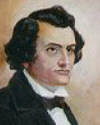 | On 10 June of a certain year, machine-frozen food was transported a significant distance in the U.S. for the first time. A shipment of frozen Texas beef had been processed by refrigeration equipment invented by John Gorrie, and delivered by the steamship Agnes in New Orleans, Louisiana. The meat was served in meals at hospitals, and celebration banquets at hotels and restaurants. In what decade was this machine-frozen food shipped? |
Fast answers for the previous newsletter for June 9: The Rocket • cotton-textile manufacturing • the process by which the chromosomes within the nucleus of a cell double and divide prior to cell division • vitamin D • Max Planck • John H. Kraft.
 If you enjoy this newsletter, the website, or wish to offer encouragement or ideas, please send feedback by using your mail reader Reply button.
If you enjoy this newsletter, the website, or wish to offer encouragement or ideas, please send feedback by using your mail reader Reply button. Your click on a Facebook, StumbleUpon, or other social button on the site webpages is also a welcome sign of appreciation. Thank you for using them.
© This newsletter is copyright 2020 by todayinsci.com. Please respect the Webmaster's wishes and do not put copies online of the Newsletter — or any Today in Science History webpage. (If you already have done so, please remove them. Thank you.) Offline use in education is encouraged such as a printout on a bulletin board, or projected for classroom viewing. Online, descriptive links to our pages are welcomed, as these will provide a reader with the most recent revisions, additions and/or corrections of a webpage. For any other copyright questions, please contact the Webmaster by using your mail reader Reply button.
--
If you do not want to receive any more newsletters, Unsubscribe
To update your preferences and to unsubscribe visit this link
Executive Real Estate Business Class
-
"It was like a man with wings. It wasn't like anything you'd see on TV or in a monster movie." ...
About the publisher
Search This Blog
Blog Archive
-
▼
2020
(1542)
-
▼
June
(193)
- TRAVEL: Epic America—Our photographers' picks
- On This Day for June 30 - Night of the Long Knives...
- Newsletter for Tuesday 30 June.
- We told you: Mass-Tracking COVI-PASS Immunity Pass...
- June 30: Theory of Evolution, the Night of Long Kn...
- HISTORY: And the symbols come tumbling down
- Explore the Ocean with Nat Geo Kids Magazine
- New This Week on History News Network
- On This Day for June 29 - London's Globe Theatre d...
- Newsletter for Monday 29 June.
- COVID Cartoon Night (not funny) while we weep for ...
- June 29: Shakespeare's Globe Theatre Burns Down an...
- FAMILY: Getting your kid to help others
- Henry VIII's surprising burial place | The world's...
- On This Day for June 28 - Assassination of Archduk...
- Say the wrong thing: lose visitation with your kid...
- Newsletter for Sunday 28 June.
- June 28: Franz Ferdinand Assassinated, the Treaty ...
- The Compass: Kenya
- How the Invention of A/C Changed US Politics
- On This Day for June 27 - Yen made official moneta...
- Newsletter for Saturday 27 June.
- June 27: 1st Women's Magazine, Nuclear Power Stati...
- CORONAVIRUS SPECIAL EDITION: The virus hasn't won ...
- PHOTOGRAPHY: A legendary photographer's enduring r...
- Partner: How to keep your kids learning vocab this...
- Archaeologists Say They've Just Solved The 400-Yea...
- The Roundup Top Ten From History News Network
- On This Day for June 26 - Opening of CN Tower, Bab...
- Newsletter for Friday 26 June.
- Contact Tracer warns of forced vaccinations plus R...
- June 26: Reconnaissance balloons, Kennedy's Clario...
- YOUR WEEKLY ESCAPE: A dangerous quest for hallucin...
- That Was No Bunny: Watch New Episode of Alone Tonight
- ANIMALS: Leave that elephant alone
- On This Day for June 25 - Korean War begun, Antoni...
- Newsletter for Thursday 25 June.
- June 25: 1st Female PhD, Custer's Last Stand, the ...
- SCIENCE: The heat wave in the Arctic
- Demystified: What Does "SPF" Mean?
- On This Day for June 24 - Russia invaded by Napole...
- Breaking News from History News Network
- Newsletter for Wednesday 24 June.
- June 24: Fatal Medieval Dance Manias, the Gadsden ...
- TRAVEL: Fear of flying and hotel rooms fuels RV boom
- Be at the Front Lines of History's Most Epic Battl...
- On This Day for June 23 - Battle of Bannockburn, C...
- Lowest US coronavirus deaths reported since March ...
- Newsletter for Tuesday 23 June.
- June 23: World's Oldest Parliament, the Contracept...
- Life Under The Shah: What Iran Looked Like Before ...
- HISTORY: A swift goodbye to some racist imagery (a...
- A whole year of Britannica Premium for $49.99?
- New This Week on History News Network
- On This Day for June 22 - Mutiny against Henry Hud...
- Newsletter for Monday 22 June.
- Clintons and Gates Connected at the Hip plus Cardi...
- June 22: Galileo Galilei Recants, Last Shot of the...
- FAMILY: How to keep kids safe as places reopen
- On This Day for June 21 - Japanese defenses destro...
- Newsletter for Sunday 21 June.
- June 21: 1st Governor General of India, Fermat's L...
- The Compass: Ecuador
- On This Day for June 20 - Casket Letters found, Ho...
- Newsletter for Saturday 20 June.
- CORONAVIRUS SPECIAL EDITION: Could public bathroom...
- Mandatory Vaccines coming: Bill Gates Accuses Tho...
- June 20: Attila the Hun, the University of Oxford ...
- PHOTOGRAPHY: Fatherhood 2020 — ‘Fear and courage a...
- Why is America haunted by its past?
- The Woman Who Claimed Emmett Till Wolf-Whistled At...
- This Week's Roundup Top Ten from History News Network
- Exclusive HistoryExtra podcasts | Listen now
- On This Day for June 19 - Rosenbergs executed for ...
- Newsletter for Friday 19 June.
- World Economic Forum starts The Great Reset initia...
- YOUR WEEKLY ESCAPE: How the ultimate shark photo w...
- June 19: London's Metropolitan Police and the 1st ...
- Predator Encounters. Watch New Episode of Alone To...
- ANIMALS: Finding the snow leopards
- Count on a Source You Can Trust
- On This Day for June 18 - War of 1812 begun, Sir P...
- Newsletter for Thursday 18 June.
- Lockdowns, tracing, testing, vaccinating, and Libe...
- June 18: US-British War of 1812, the Battle of Wat...
- SCIENCE: They grew fearsome. They began soft, and ...
- Demystified: How Are Sports Chosen for the Olympics?
- Breaking News from History News Network
- On This Day for June 17 - Arrest of O.J. Simpson, ...
- Newsletter for Wednesday 17 June.
- June 17: Mumtaz Mahal, the French Revolution and G...
- TRAVEL: They hurtled the world's highest point
- Explore together with Nat Geo Kids magazine
- On This Day for June 16 - First woman in space, Jo...
- Newsletter for Tuesday 16 June.
- June 16: Salvation Army Forms, Bloomsday and FDR's...
- HISTORY: Why we can’t shake COVID-19
- New This Week on History News Network
- On This Day for June 15 - Magna Carta sealed by Ki...
- Yes, they really are forcing changes to your world...
-
▼
June
(193)
-
Blogroll
-
About
HistoryFact










0 comments:
Post a Comment